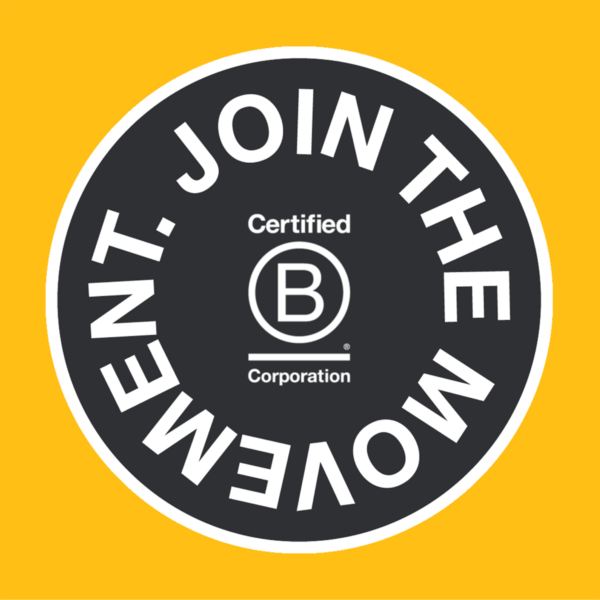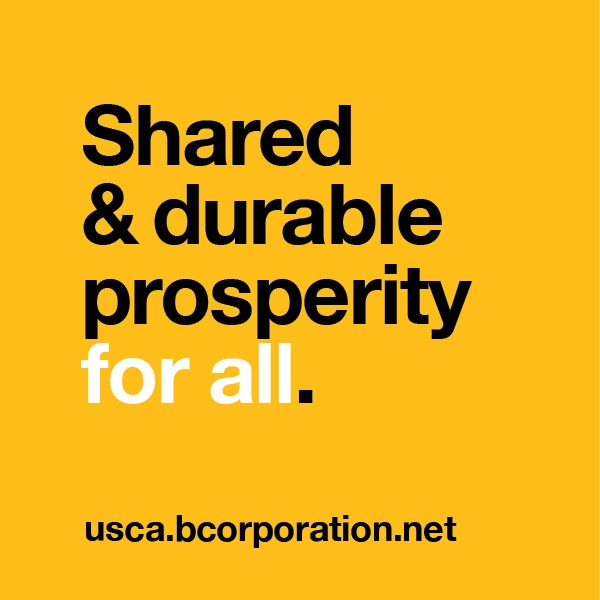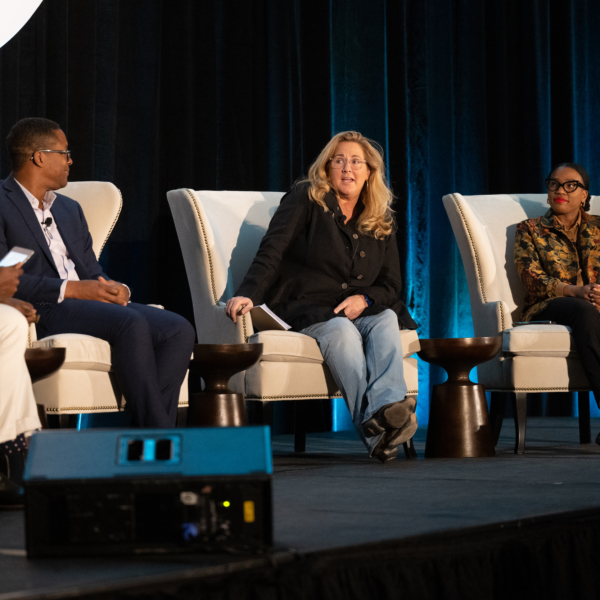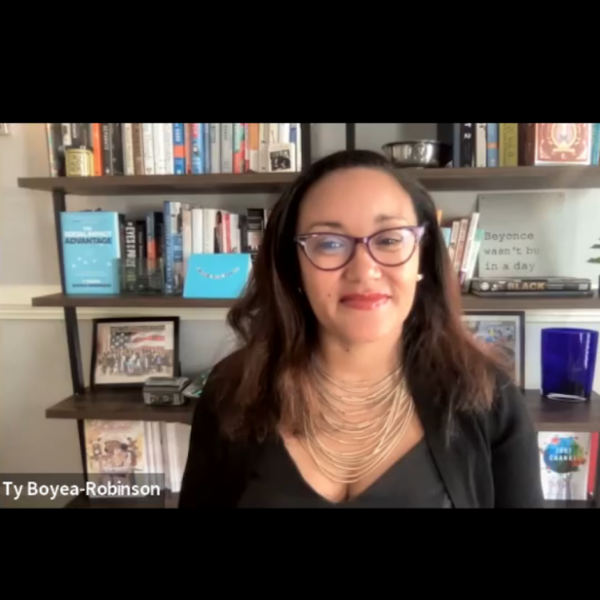Building Business Practices and Programs to Support Racial Equity After Affirmative Action’s Repeal
August 9, 2023
B Corps Reduce Barriers to Employment and Seek Worker Ideas for Inclusion
Certified B Corporations and their partner organizations are pursuing economic inclusion and opportunity for all people. They are doing so by adjusting hiring and recruitment initiatives and reshaping workplace policies. Racial equity, one pillar in B Lab U.S. & Canada’s Theory of Change, requires further consideration and investment after the U.S. Supreme Court’s ruling to end affirmative action in college admissions.
The ruling threatens years of racial equity practices in higher education. As shared in a statement by B Lab U.S. and Canada: “Ending affirmative action will reduce the future earnings of many Black and Latinx people and widen the racial wealth gap. … The impact it has had on equity in higher education is undeniable. Affirmative action has led to higher representation of Black, Indigenous, and other students of color at selective universities. This has meant higher-paying jobs, leadership positions, and access to other spheres of influence that still remain mostly white.”
The ruling led some business leaders to ask whether and how their organizations can advance racial equity. Charlotte A. Burrows, Chair of the U.S. Equal Employment Opportunity Commission (EEOC) that enforces laws against workplace discrimination, released a statement after the ruling providing some guidance. The ruling, she said, “does not address employer efforts to foster diverse and inclusive workforces or to engage the talents of all qualified workers, regardless of their background. It remains lawful for employers to implement diversity, equity, inclusion, and accessibility programs that seek to ensure workers of all backgrounds are afforded equal opportunity in the workplace.”
B Corps have the potential to launch and build more inclusive and equitable policies, especially when it comes to hiring and training practices. Some ideas and innovations highlighted in this article are shared by:
- Thurgood Marshall College Fund (TMCF), a nonprofit organization and partner in B Lab U.S. & Canada’s Racial Equity Impact Improvement Program. TMCF provides scholarships, targeted programming, and internships for students at historically Black colleges and universities.
- Guild, a B Corp that prioritizes worker input and feedback in its internal inclusion and equity work.
- Intuitive Digital, a B Corp that updated its job descriptions and hiring process to remove potential barriers for applicants.
A note on language: Inclusion and justice in business and society are continually evolving, including in the terms used in this article. Multiple acronyms are currently included in this work’s lexicon and are represented in the quotes of those contacted by B The Change for this article, including JEDI (justice, equity, diversity, and inclusion) and DEIB (diversity, equity, inclusion, and belonging).

How B Corps Can Lead in the Wake of Affirmative Action’s Repeal
In this statement from B Lab U.S. & Canada, read more about the importance of business leaders getting to work to advance racial equity.
Connecting with a Talent Pipeline of Students from Historically Black Universities and Colleges
Business leaders and other individuals can continue to support higher education opportunities through organizations such as TMCF. The nonprofit represents students at its 53 member-schools, including public historically Black colleges and universities (HBCUs), medical schools, and law schools, while providing programming across the Black college community.
Rob Knox, Senior Director of Strategic Communication at TMCF, said the nonprofit provides scholarships, targeted programming, and student internships. Many are first-generation students on the pathway to greater opportunity and prosperity — academically, socially, and economically. “Companies can use the essential pipeline of talented students from the colleges and universities that TMCF supports as a starting point for a deep and diverse applicant pool,” Knox said.
Companies that provide opportunities for mentorship, professional development, and paid internships for students from historically Black colleges and universities create workplaces where employees from diverse backgrounds can feel valued, supported, and empowered to succeed, Knox said.
“Through this work, students enhance critical skills, gain amazing work experience, and build networks that increase their opportunities for post-graduate success, which companies can support once the students enter the workforce,” he said.
Knox said additional ways to support organizations that advance equity and opportunity include volunteering, forging corporate partnerships, using business platforms to advocate and build awareness of equity and inclusion practices, and obtaining services and goods from diverse-owned businesses. Corporate or individual donations to nonprofit organizations like TMCF help them provide resources and programming.
Collecting Employee Ideas and Feedback Year-Round to Spark Action and Build Trust
B Corp Guild partners with companies to provide a career opportunity platform that provides learning programs, career development, and one-on-one coaching for workers. While those programs help other companies build a more diverse workforce, Guild also boasts innovative internal initiatives that incorporate worker feedback to enhance inclusion and equity.
Malaika Serrano, Vice President for Diversity, Equity, and Inclusion at Guild, said empowering all employees to be involved in the DEIB (diversity, equity, inclusion, and belonging) strategy helps create a more inclusive and open workplace.
“The work can’t, and shouldn’t, fall only to one small area of the business to be effective,” she said.
To promote a culture of continuous feedback and agile intervention, Guild shifted from biannual to biweekly employee experience surveys. “We realized that asking a number of questions measuring the employee experience twice a year — in a dispersed workforce — was simply not enough or effective,” Serrano said. “Year-round feedback gives managers the opportunity to see quickly where they need to focus their efforts and attention versus feeling they have to guess or, worse, wait for a survey that comes around just twice a year.”
Guild also is transparent with its survey results to help build trust and reinforce two-way communication. “We have taken a great deal of employee and stakeholder feedback to make this experience as user-friendly as possible,” Serrano said. “We send out a survey summary report following each survey reminding each individual how they responded to the questions, along with the aggregate company scores, so they can see as one team how we’re doing.”
Serrano said the B Corp also introduced an anonymous DEIB survey to help identify potential differences in employee experiences. Workers who opted to participate in the survey could share how they identify across various demographics.
Serrano provided a few more suggestions for businesses seeking to develop or build more inclusive practices:
- Agree on shared language about goals. Fear of using incorrect language creates barriers to conversations about important topics regarding inclusion.
- Use metrics and data rather than anecdotal narratives to inform conversations and decisions.
- Be open about what you’re trying to do. This helps build trust and partnerships with colleagues across the organization.
- Support and mobilize employee resource groups to create programming by and for members of historically excluded groups. This could include compensation for leadership, a dedicated program manager, or suitable budgets for events, initiatives, or professional development.
- Remember the small things that add up to create inclusive environments. These include using personal pronouns during introductions and considering physical spaces and accommodations.

Anti-Racism Business Resource: Commit and Act
This guide from B Lab provides commitments, actions, and ideas for business leaders ready to shift toward anti-racist business practices.
Updating Job Requirements to Remove Barriers to Employment
Alysha Schultz, Vice President of Marketing and Culture at Intuitive Digital, said the digital marketing agency made changes to address potential barriers for job applicants. “We’ve removed outdated job requirements for all our positions, such as four-year college degrees, which are not necessary for the majority of positions at our company.”
Intuitive Digital also realizes the importance of creating pathways to higher education for more people, Schultz said. Intuitive Digital launched a digital marketing scholarship with other B Corps and businesses. Students in underrepresented groups — including those who are Black, Indigenous, People of Color, and/or LGBTQIA+ — can apply for funds to help cover the costs of tuition, fees, or books and equipment.
Other inclusion initiatives at Intuitive Digital include a partnership with Construct the Present to evaluate its organizational culture and provide annual all-team trainings on topics related to systemic racism and LGBTQIA+ allyship. “All new team members receive a DEIB onboarding so team members clearly understand our company culture and code of conduct expectations,” Schultz said. “It covers a variety of areas like unconscious bias, pronoun usage, and gender identity.”
To maintain a focus on inclusion, Intuitive Digital has a committee focused on justice, equity, diversity, and inclusion (JEDI). The JEDI committee organizes ongoing training and education and handles JEDI-related concerns that employees can make through a virtual, anonymous box. “The committee can review and take action to mitigate any current issues and prevent fear of retribution from team members for reporting issues,” Schultz said.
Worker feedback on organizational culture is collected through anonymous surveys and interviews conducted by Construct the Present. The JEDI committee uses that information to adjust programs and policies.
Schultz recommends working with a partner organization like Construct the Present to help drive change and encourage a more open workplace. “The reason your company has less-than-inclusive practices persisting is that your team isn’t currently equipped to see and address them. Bringing in a fresh set of eyes can make a huge difference,” she said.
“To ensure you make lasting, meaningful change, you need to be committed to the outcome at all levels of the company. You can’t have an inclusive company if you don’t have inclusive individuals.”
Schultz also acknowledges that building more inclusive companies is a journey of learning and experimentation. “This kind of change takes time. It’s about progress, not perfection,” she said. “As long as you keep working to move further down the path, you’re doing important work.”
Sign Up for our B The Change Newsletter
Read stories on the B Corp Movement and people using business as a force for good. The B The Change Newsletter is sent weekly.




